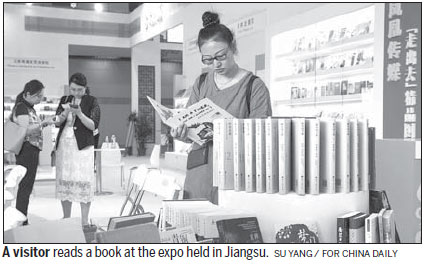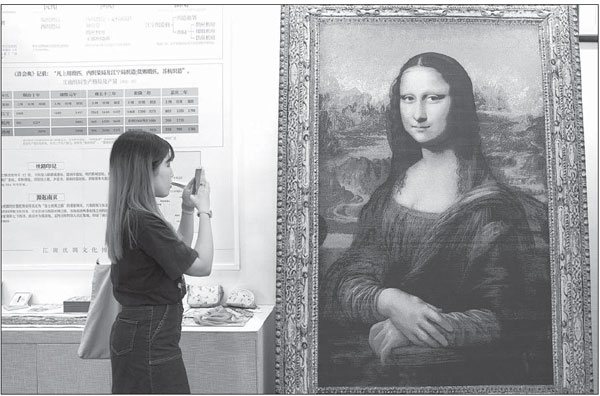Jiangsu trade expo sees slew of contracts signed
Three-day event exhibits province's copyright success stories, facilitates negotiations
A copyright trade expo in Jiangsu province saw 43 companies sign copyright contracts worth 123 million yuan ($18.68 million) on site and 4.38 million yuan in copyright products sold.
The three-day event, which started on Sept 15, aimed to exhibit the achievements of Jiangsu's copyright industry, organize copyright trade negotiations and gather resources related to copyright innovation.
More than 200 companies showcased nearly 10,000 products in a 14,800-square-meter exhibition area in the Nanjing International Exhibition Center.
Among the companies were Omnijoi Media Corp from Jiangsu and noted software companies such as United States computer giant Microsoft.

Creative products from different regions in Jiangsu could be seen, including traditional copyright products such as silk, embroidery and books, and also digital entertainment content, including virtual reality games and online literature, Beijing-based iprchn.com reported.
Some exhibits from the Nanjing Museum Administration, which were designs based on cultural relics, received praise from visitors.
A representative from the organization said China has encouraged museums to develop culturally creative products since last year. As a result, the Nanjing Museum Administration developed six series of products by using cultural relic elements from its seven museums.
The expo offered eight professional exhibition areas for displaying the copyright trade achievements of Jiangsu's works of literature, and for promoting the province's noted literary writers and their work.
More than 50 professional seminars were also hosted during the expo. Among the topics heatedly discussed was copyright protection.
Qu Hanbin, director of Nantong Jiayusi Textile Group's IP department, said the company has had 419 copyright registrations since the beginning of this year.
Once piracy is discovered, registration certificates can be used to make complaints or file lawsuits and it is a great protective measure, Qu said.
Qu's company started to apply for patents in the 1990s and won three infringement lawsuits in Guangzhou, Guangdong province, last year.
Song Jian, from the Jiangsu High People's Court, said that the home textiles industry in Nantong, a city in southeastern Jiangsu, had developed rapidly because related companies highly valued IP protection.

Companies that utilize copyright use the expo as a platform, Song said, adding the event gathered companies, showcased creativity and expressed their ideas.
Song said by communicating at the expo, she knew more about companies' specific demands in IP protection and hoped to solve their practical problems via more effective judicial services.
Ma Xiaoyan, a professor from the School of Law at Nanjing Normal University, said the fact that many people do not value copyright was a cause of piracy and many copyright owners were unaware of their rights for protection.
Some even had no idea their rights had been infringed, she added.
As for ideal models for copyright protection, Ma told Jiangsu-based newspaper Xiandai Kuaibao that judicial litigation was just one method.
"Many people complain that the cost of copyright protection is high and it is time-consuming," Ma said.
"Actually companies and individuals should have the awareness about protection."
Ma added that they could collect evidence in the copyright creation process. Even if their rights were subsequently infringed, they could disclose it through the press and lawyers, to put pressure on infringers and so achieve a positive outcome.
|
A visitor takes a picture of a silk artwork at the copyright trade expo held in Jiangsu province.Su Yang / For China Daily |
(China Daily 09/21/2017 page17)















